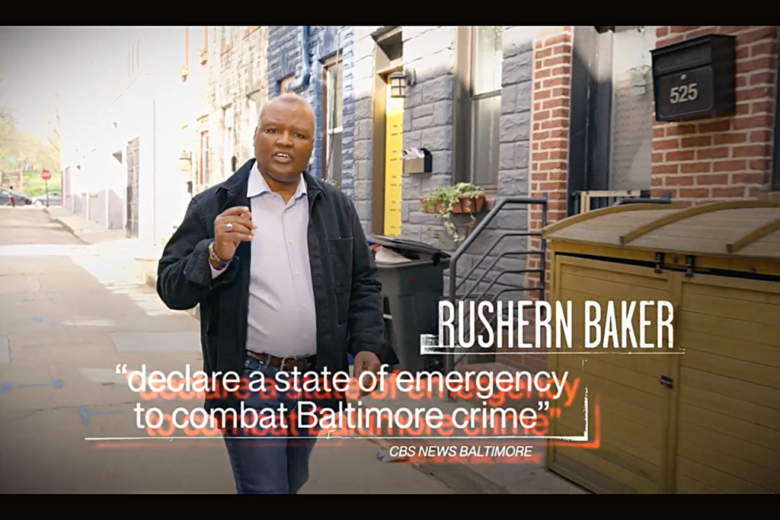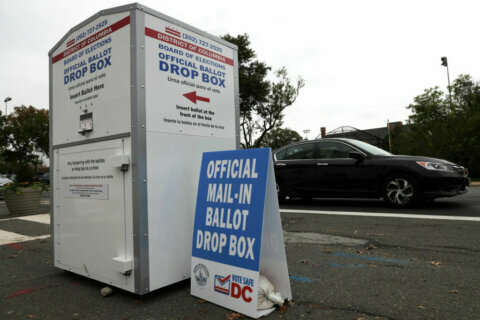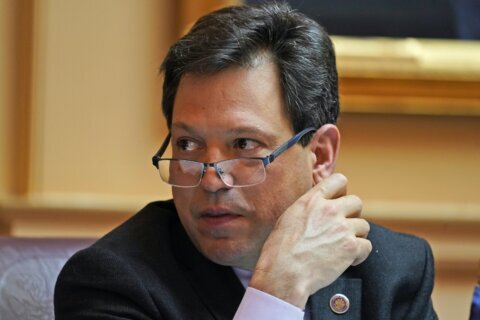This article was republished with permission from WTOP’s news partners at Maryland Matters. Sign up for Maryland Matters’ free email subscription today.
This content was republished with permission from WTOP’s news partners at Maryland Matters. Sign up for Maryland Matters’ free email subscription today.
Former Prince George’s County Executive Rushern L. Baker III launched the first TV ad of his campaign for the Democratic gubernatorial nomination Monday — a 30-second spot that focuses on crime in Baltimore.
The ad was produced by Ralston Lapp Guinn Media, a Washington, D.C.-based Democratic media firm.

It begins with images of young Black men, chalk outlines and police tape. Most of the rest of the ad features Baker, walking down a Baltimore street, addressing the camera using blunt language not typically employed by politicians.
“In the last eight years, over 2,000 mostly young Black men have been killed in Baltimore,” Baker says. “Because they’re Black, nobody in power gives a damn.”
Baker goes on to recount his history fighting crime in Prince George’s, and says he’ll “work like hell” to fix the problem in Baltimore.
Baker has focused his campaign in recent months on attracting votes in Baltimore, including pledging to move the governor’s office from Annapolis to the city if he’s elected. He lays out some of his other policy prescriptions in the ad.
“We’re going to stop the slaughter of young Black men and turn Baltimore around,” he says at the end of the ad.
The Baker campaign said the ad will air in the Baltimore TV market throughout the month of May. It did not say how large a buy the campaign is making.
Baker is one of nine candidates seeking the Democratic nomination in the July 19 Democratic primary.
More thorough on Thiru poll
Last month, the Baltimore Brew published excerpts of a poll of likely Democratic primary voters that had been conducted for Thiru Vignarajah’s campaign for Baltimore City state’s attorney.
The survey showed Vignarajah running within the margin of error in the three-way Democratic primary, with incumbent Marilyn J. Mosby at 35%, Vignarajah at 32%, and Ivan Bates at 13%. Nineteen percent of the voters surveyed were undecided.
We can now provide a few more details about the poll of 400 likely voters, which was conducted April 12-14 by the Washington, D.C., Democratic polling firm Greenberg Quinlan Rosner and carried a 4.9-point margin of error. An earlier iteration of that firm handled President Clinton’s polling in 1992.
The state’s attorney primary is a rerun of 2018, when Mosby, then seeking a second term, took 49% of the vote compared to 28% for Bates and 23% for Vignarajah. But much has changed since: There’s a perception in Baltimore that crime is surging, Mosby is under federal indictment, and Vignarjah’s visibility in the community has been boosted by his 2020 run for mayor and his frequent appearances on Fox 45, the Sinclair-owned TV station.
The Brew article showed that Mosby is underwater in the poll, viewed favorably by 38% of the primary electorate and unfavorably by 44%. But here’s some more detail: 22% of those surveyed said they view her very favorably and 16% said they view her somewhat favorably. Nine percent said they viewed her neutrally, while 17% said they viewed her somewhat favorably and 27% said they viewed her very unfavorably. She was unknown to only 9% of the electorate.
Vignarajah’s favorable/unfavorable ratings were 45%/17%, broken down as 22% very favorable, 23% somewhat favorable, 6% somewhat unfavorable and 11% very unfavorable. He was viewed neutrally by 6% of those surveyed, while 32% said they had not heard of him or had no opinion.
Bates had a 26%/13% favorable-unfavorable rating: with 8% of voters very favorable, 18% somewhat favorable, 6% somewhat unfavorable and 7% very unfavorable. Ten percent of primary voters said they viewed him neutrally, while 51% said they did not know him or had no opinion.
Of the 35% of voters who said they favored Mosby in the primary, 21% said they strongly supported her and were unlikely to change their position. Of the 32% supporting Vignarajah, 20% described themselves as strong supporters. Bates’ 13% included 4% of primary voters who said they were strong supporters.







